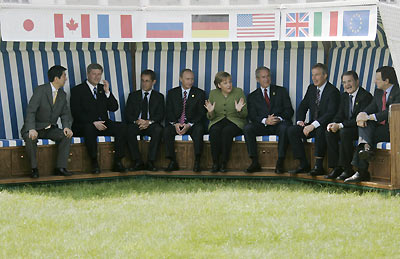
Left to right: Japanese Prime Minister Shinzo Abe, Canadian Prime
Minister Stephen Harper, French President Nicolas Sarkozy, Russian President
Vladimir Putin, German Chancellor Angela Merkel, U.S. President George W. Bush,
British Prime Minister Tony Blair, Italian Prime Minister Romano Prodi and
European Commission President Jose Manuel Barroso sit in an oversized beach
chair in Heiligendamm yesterday. Leaders from the world's major industrialised
nations meet in the Baltic resort of Heiligendamm on June 6-8 for a Group of
Eight summit. (Xinhua/Reuters Photo)
Leaders from the Group of Eight (G8) leading industrialized
powers yesterday sealed a compromise on climate change which German
Chancellor Angela Merkel described as a "real turning point."
Merkel told reporters that the leaders have agreed to "substantially" cut
greenhouse gases in the fight against climate change, which is a "great
success."
According to the chancellor, the G8 leaders have agreed to "seriously
consider" the decisions made by the European Union, Canada and Japan of cutting
carbon emissions by 50 percent below the 1990 levels by 2050.
They also agreed to tackle climate change within the framework of the United
Nations, said Merkel.
"What can be most possibly achieved has been achieved," said Merkel.
The agreement sent a "strong signal" for the UN climate conference to be held
in December in Bali, Indonesia, designed to kick off the international
negotiations for a post-Kyoto agreement, she said.
According to a draft of the G8 summit declaration issued Thursday, the
leaders agreed that further actions on climate change should be based on the UN
principle of "common but differentiated responsibilities and respective
capabilities," with G8 nations taking the lead.
"We acknowledge the continuing leadership role that developed economies have
to play in any future climate change efforts to reduce global emissions," it
said.
Meanwhile, the G8 nations would "invite" the emerging economies, including
China and India, to "address the increase in their emissions by reducing the
carbon intensity of their economic development," said the declaration.
Still, environmental organization Greenpeace said it was disappointed by the
G8 agreement.
"This is too little," said Greenpeace, noting that the G8 leaders have
finally failed to agree on binding targets.
Germany, which holds the rotating G8 presidency, has called for actions to
limit the rise in global temperatures to 2 degrees Celsius this century, which
experts say requires a global reduction in emissions of 50 percent below 1990
levels by 2050.
However, the United States, the world's biggest greenhouse gas producer, had
voiced "fundamental opposition" to mandatory targets, making climate change one
of the most controversial issues during the upcoming G8 summit.
Shortly before the summit, U.S. President George W. Bush announced a separate
plan, calling on 15 of the world's biggest greenhouse emitters to meet and agree
on long-term goals by the end of 2008.
The United States, which has not signed the Kyoto Treaty, said environmental
protection cannot come at the price of hurting economic growth.
On another contentious issue concerning the U.S. plan of a missile defense
system in Central Europe, Russian President Vladimir Putin made a surprise offer
to his U.S. counterpart George W. Bush.
Putin told Bush that Moscow would not oppose a U.S. plan of a radar-based
missile defense system in Europe if it was deployed in Azerbaijan instead of
Central Europe.
Speaking to reporters following their eye-catching meeting, Bush described
Putin's proposal as "interesting."
"We have a desire to work together," Bush said, adding that he and Putin
would discuss the proposal at their summit on July 1-2 at the Bush family
compound in Kennebunkport, Maine.
According to U.S. National Security Adviser Steve Hadley, defense experts
from the two sides will discuss the possibility of Putin's initiative.
Putin said he was satisfied with talks with Bush and explained that an
Azerbaijan-based U.S. missile defense shield would alleviate Russia's concerns
about it, which would cover all of Europe rather part of it.
Reports said that the two leaders also agreed to a strategic dialogue
involving military and diplomacy.
The meeting between the two on the sidelines of the Group of Eight (G8)
summit was aimed to reduce high tension between the two sides over the U.S. plan
of deploying the missile defense shield in the Czech Republic and Poland.
Washington plans to place a radar system in the Czech Republic and
interceptor missiles in neighboring Poland in the name of defending possible
attacks from Iran.
Russia has accused Washington of raising a new arms race in the region, which
Washington denies.
On Thursday, Putin also hold face-to-face talks with Canadian Prime Minister
Stephen Harper, French President Nicolas Sarkozy and Japanese Prime Minister
Shinzo Abe.
The three-day G8 summit opened Wednesday evening, and concludes on Friday.
In a summit declaration released on the official website of theG8 event, G8
leaders called for more efforts to adjust global imbalances when the world
economy is in good, although they appeared upbeat about the world economy.
"We note that the world economy is in good condition," the G8 leaders said in
the declaration.
"Growth is now more balanced across regions, as it has moderated to a more
sustainable pace in the United States, while domestic demand has strengthened in
Europe and remains supported by robust investment in Japan," they said.
They also pledged to intensify anti-corruption efforts, both at the national
and international levels, terming the fight against corruption "one of the most
important tasks of the G8."
In the meantime, they called for joint global efforts to secure freedom of
investment.



